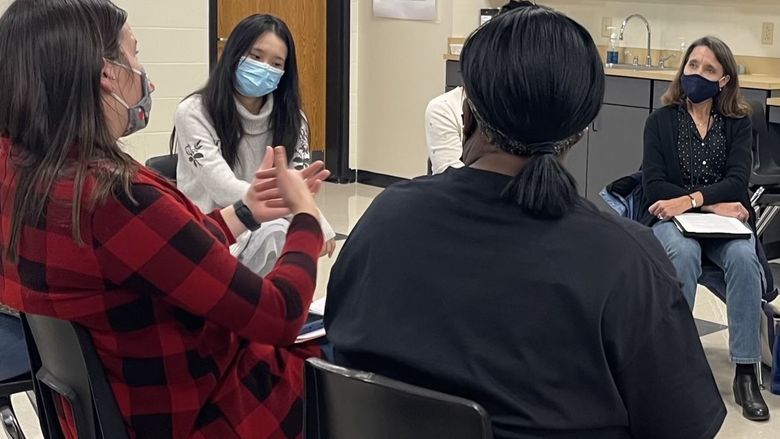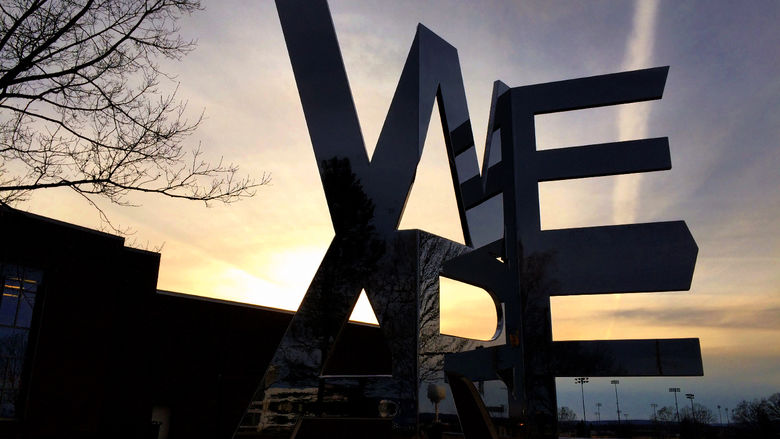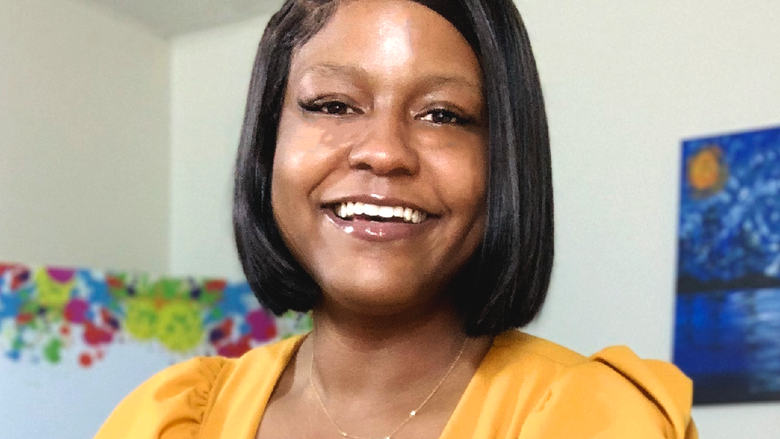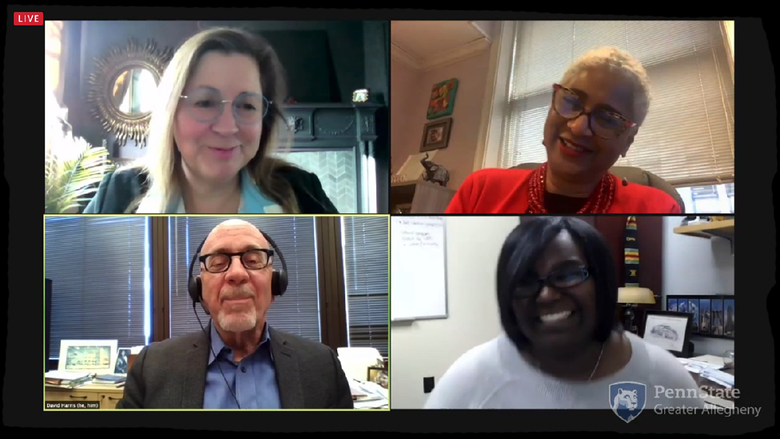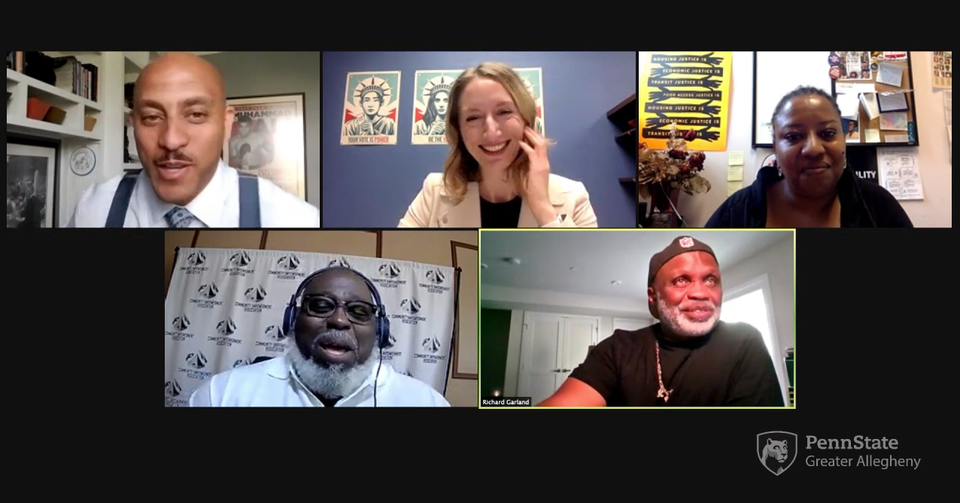
Penn State Greater Allegheny's Oct. 14 Crossing Bridges panelists and moderator. (Left to right) Hasan Jeffries, associate professor, Department of History, The Ohio State University; Katherine McLean, moderator, associate professor of criminal justice, Penn State Greater Allegheny; Brandi S. Fisher, president and CEO, Alliance for Police Accountability; Rashad Byrdsong, founder and CEO, Community Empowerment Association; and Richard Garland, assistant professor of public health practice, The University of Pittsburgh Graduate School of Public Health and a member of the Pittsburgh Community Taskforce for Police Reform.
MCKEESPORT, Pa. — Calls for transparency and accountability in policing accelerated across the nation in the wake of George Floyd’s death in Minneapolis in 2020, while he was in police custody. The Pittsburgh region was not immune to these calls, given a 2018 high-profile incident in which Antwon Rose, an unarmed Black teenager, was fatally shot by a police officer in East Pittsburgh.
In 2020, the City of Pittsburgh delivered the “Pittsburgh Community Taskforce for Police Reform” report, an examination of policing in the city, and proposed recommendations for reform. This report is the basis for Penn State Greater Allegheny’s 2021-22 Crossing Bridges Summit, a three-part series produced and broadcast on WPSU. The series is available at watch.psu.edu/crossingbridges. A fourth event will be held in-person on April 7, at the Greater Allegheny campus.
“Our Crossing Bridges Summit committee read the taskforce report with great interest,” said Jacqueline Edmondson, chancellor and chief academic officer at Penn State Greater Allegheny. “We have employees who live in Pittsburgh, and we draw students from many neighborhoods in the city. We are personally invested in and supportive of work that improves our communities, and we recognize we can learn from the thorough and honest review of policing in the City of Pittsburgh and consider the implications for the Mon Valley where our campus is located.”
"We recognize we can learn from the thorough and honest review of policing in the City of Pittsburgh and consider the implications for the Mon Valley where our campus is located.”—Jacqueline Edmondson , chancellor and chief academic officer at Penn State Greater Allegheny
The first event, “Voices of Activists and Scholars” was held on Oct. 14 and assembled local and national experts who gave a historical and practical perspective of policing. Joining panel moderator Katherine McLean, associate professor of criminal justice at Greater Allegheny, were Rashad Byrdsong, founder and CEO at Community Empowerment Association; Brandi S. Fisher, president and CEO at Alliance for Police Accountability; Richard Garland, assistant professor of public health practice at The University of Pittsburgh Graduate School of Public Health; and Hasan Jeffries, associate professor, Department of History at The Ohio State University.
Garland, a member of the task force, reviewed the eight key areas the report highlighted for reform. Those areas include eliminating racial disparities; officer wellness; reimagining policing recruitment, training, education and hiring; relations with Pittsburgh’s Fraternal Order of Police; transparency; accountability; use-of-force changes needed to Pittsburgh Bureau of Police Policy; and use of tear gas, rubber bullets, “flash-bang” devices and other less lethal methods of crowd control.
One of the recommendations Garland expanded on was recruitment, training and education. There are 130 municipalities in Allegheny County and he noted the lack of consistency in the approach to training.
“We have a lot of officers, part-time officers in these different county communities who don't receive the same kind of training that the Pittsburgh police officers do,” Garland said. “There should be a better connection with the county municipalities.”
Garland said a lack of appropriate training results in young African American youth being “targeted” by police in those communities. He also addressed the impact recruitment has on those communities.
"When we talk about eliminating racial disparities, when we go to those county communities, many of the officers don't look like the kids or other folks in the community," he said. "So that's one of the things that I want to make sure that is really addressed.”
"When we talk about eliminating racial disparities, when we go to those county communities, many of the officers don't look like the kids or other folks in the community. So that's one of the things that I want to make sure that is really addressed.” — Richard Garland, assistant professor of public health practice at The University of Pittsburgh Graduate School of Public Health
As a historian, Jeffries provided insight on how activism for police reform is creating broader movements for racial justice based on the constant cycle of attempts to curb crime and the disparities among populations that result.
“What we see in the Pittsburgh area and in the Greater Allegheny area is not unique to this particular place, not unique to just Pittsburgh or Pennsylvania or the Midwest,” said Jefferies. “This is a national phenomenon.”
Through her role with the Alliance for Police Accountability, a group dedicated to criminal justice reconstruction that specializes in bettering community/police relations, Fisher is familiar with disparities. She discussed the need to invest in people and beneficial services as an example of reimagined policing.
“People say the conversation is about policing, but at the root cause of it, the policing is a response,” said Fisher. “The root cause of it is really this lack of investment. When we talk about reimagined policing, we are saying when we have someone who is experiencing homelessness instead of arresting them, give them services, find what they need, provide them with shelter. When we reimagine these things, we are talking about investing in people. That will help us a lot when it comes to disparities.”
McLean asked Byrdsong to discuss efforts he and other activists take to create partnerships with police and engage community support in areas where there have been high rates of violence. He referenced funding, investments, and the need to be active on the ground to address disparities in black and brown communities.
“One of the things that activists are not calling for is to get rid of the police,” Byrdsong said. “When we talk about defunding the police, it's saying look at the budgets of the police throughout the country. Look at recommending other policies that could address demilitarization of law enforcement.”
He reflected on the structure of communities and relationships from his youth. “At some point we need to realistically talk about the relationship between the police and the community,” Byrdsong said. “When I was young, the police lived in the community. When we talk about real transparency and community relationships, we are going to have to do a real deep assessment on the culture of law enforcement and relationship to black and brown people here in America.”
“At some point we need to realistically talk about the relationship between the police and the community.”—Rashad Byrdsong , founder and CEO at Community Empowerment Association
Penn State’s University Police and Public Safety (UPPS) officers are visible and engaged with their respective campus communities, according to Edmondson. At Greater Allegheny, officers attend campus and athletic events, dine in the Café Metro, and offer educational programing. One Greater Allegheny officer, Jim Castelli, watched the panel and participated in the follow-up Summit Talks.
“We believe one key way to strengthen the relationship between our department and the broader community is to work alongside each other to solve community problems,” said Castelli. “One way we can do this is by looking at the 2021 UPPS Community Survey findings, which are expected to be available in early 2022, and use that information to work together and develop solutions to any identified areas of concern.”
Edmondson echoed the importance of implementing change by listening and collaborating.
“During our Summit Talk, our Greater Allegheny colleague Shelly Brown, a former police officer, facilitated a breakout group that emphasized the importance of listening to community members’ stories and experiences,” said Edmondson. “Universities can play a role in supporting reform and change through careful listening and collaboration. We strive to do this at Greater Allegheny, but their observations were a good reminder of the importance of connecting with local groups and citizens as we work to enact change.”
The Crossing Bridges Summit continues Tuesday, Nov 16, from 3 to 4:30 p.m., when Eric Ewell, Penn State Greater Allegheny’s director of continuing education and coordinator of the Mon Valley LaunchBox, moderates “Voices of Citizens and Victims,” featuring local activist Leon Ford, along with Michelle Kenney, mother of Antwon Rose. The event will be broadcast live at https://www.watch.psu.edu/crossingbridges.
Immediately following the panel, people are invited to attend the Summit Talks on Zoom. Participants will learn about Greater Allegheny’s Project GAME (Giving Adolescents Meaningful Experiences). Ewell, LaVaughn Wesley, Project GAME director, and Khari Hicks, success coach will discuss their work to help youth in the Mon Valley and surrounding areas become vested in their personal growth. To receive the link to the Summit Talk, visit https://www.ga.psu.edu/summittalks.
The Crossing Bridges Summit began in 2017. It comprises five pillars: the Speakers Series, Summit Talks, student-led Unity Talks, a Visiting Scholar program, and a Task Force on Racial Equity and Justice. For more information, please visit https://www.greaterallegheny.psu.edu/cbsummit.


